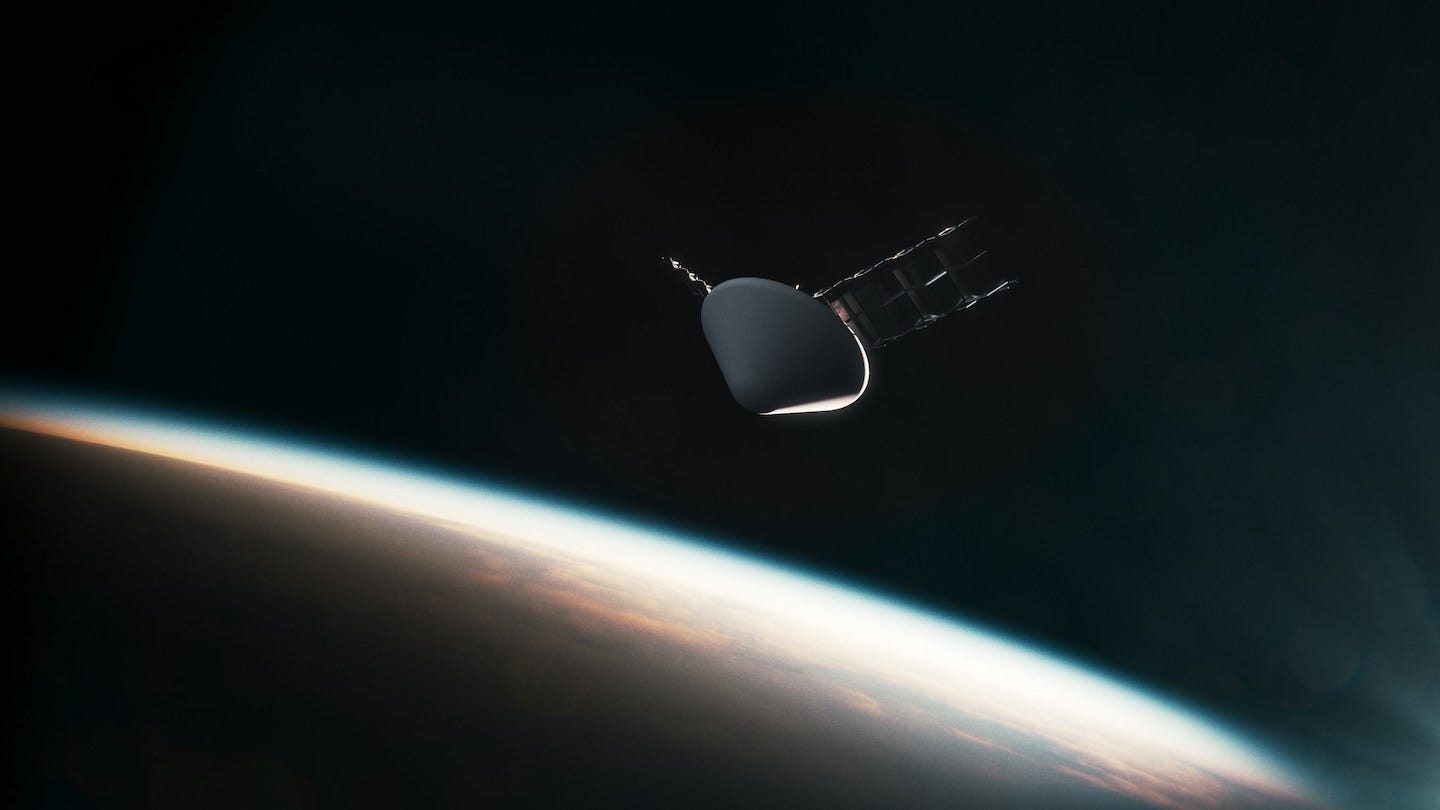Lux Aeterna Emerges from Stealth, Announces Funding for Fully Reusable Satellite Platform
Denver-based Lux Aeterna, a new startup targeting reusable satellite bus platforms, emerged from stealth on June 25th with $4 million in pre-seed funding. Lux Aeterna’s Delphi satellite, slated for launch in 2027, is equipped with a heat shield and parachute to ensure safe atmospheric reentry and landing.
The 200-kilogram Delphi demonstrator will be fitted with a new payload and relaunched to validate a business model aimed at reducing costs while enhancing sustainability and resiliency, according to Lux Aeterna founder and CEO Brian Taylor. If successful, it could reduce the cost of launching satellite payloads into space as well as make the process more flexible, as current satellites are designed to remain in orbit for years and cannot be modified for other uses.
“Although the satellite industry has evolved rapidly, its core infrastructure remains designed to be disposable,” said Taylor, who founded Lux Aeterna in August after holding engineering roles at SpaceX, Amazon Project Kuiper, and Loft Orbital.
Satellite manufacturers have advanced significantly in mass-producing satellites that are increasingly capable, but ultimately destined to burn up in the atmosphere once their fuel is depleted. Lux Aeterna sees an emerging opportunity among operators seeking greater flexibility and control over mission timelines.
“I did extensive work on designing a satellite that can be produced at a rate of six per day,” Taylor said, recalling his role in structurally qualifying the first stack of 60 spacecraft for SpaceX’s Starlink broadband constellation. “That [disposable model] works exceptionally well when you design the satellite around the payload,” he said. However, for smaller systems, comprising between one and 100 satellites, Taylor foresees an opportunity for reusability to take root. “The decline in launch costs drives this change," he said. "There is a limit to how inexpensive you can make a satellite, even with all the advantages of economies of scale, reaching the material cost. So, the only way to further reduce costs is through reusability, which [SpaceX’s partly reusable] Falcon 9 has demonstrated quite effectively.”
Designing satellites with reentry capabilities from the outset opens the door to new mission architectures and provides customers with more economic agility by tying costs directly to time spent in orbit. According to Taylor, this flexibility appeals particularly to technology developers wanting to test systems briefly in space, and in-space manufacturers, where missions may last from one day to six months, depending on the application. The ability to retrieve a satellite early could also substantially lower costs for missions that do not proceed as planned, including savings on hardware, ground station operations, and other expenses.
Lux Aeterna intends to fly a customer payload on its demonstration mission in early 2027 but has not provided specifics. Unlike reentry spacecraft designed for cargo and crew, or inflatable structures being explored by space agencies, Lux Aeterna will employ a rigid heat shield as the satellite's structural bus. “Rather than adding a heat shield to an existing satellite, we build all components around this main structure, which is the heat shield,” Taylor explained. “When launched, it appears, feels, and functions like a satellite. It is not a capsule or space plane.” This familiar form factor and operational profile aim to ease adoption for satellite operators and payload developers, he added.
Lux Aeterna’s Delphi satellite is scheduled to launch on a Falcon 9 rideshare mission. Future satellites will be slightly larger than the demonstrator but remain compatible with Falcon 9 launches. The satellite will use onboard propulsion to guide its return to Earth, and Lux Aeterna is collaborating with the Federal Aviation Administration on a flight safety analysis for its first mission.
The startup currently employs seven people at a 550-square-meter engineering and integration facility in Denver, which became operational in December.
Space Capital led the company’s pre-seed funding round, joined by Dynamo Ventures, Mission One Capital, Alumni Ventures, Service Provider Capital, and strategic deep tech angel investors. "We backed Lux Aeterna because this team has been at the leading edge of satellite innovation for years - building some of the most advanced spacecraft at the most ambitious companies," stated Space Capital. "That experience gave them a rare vantage point to rethink how satellites are designed, deployed, and reused. They're not just iterating - they're stepping boldly into what's next. With the DoD actively seeking more dynamic and recoverable space platforms, this capability is urgently needed."




